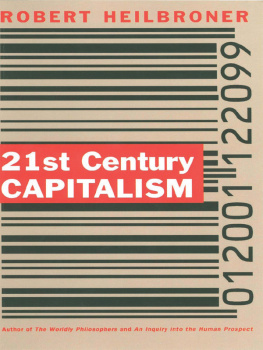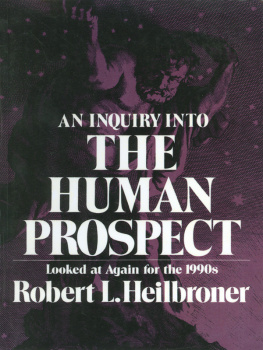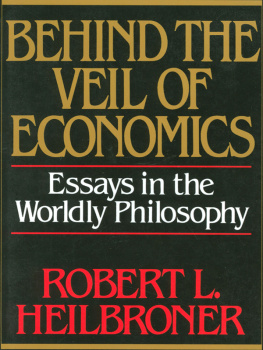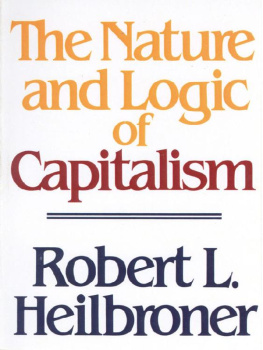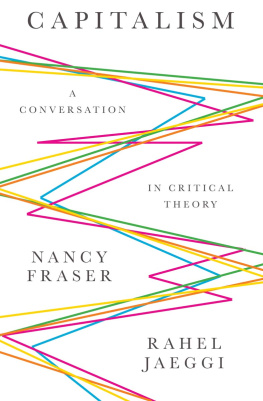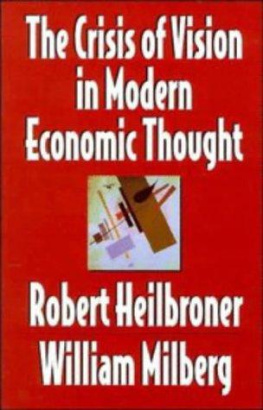TWENTY-FIRST CENTURY CAPITALISM
ROBERT HEILBRONER

Copyright 1992 Robert Heilbroner
All rights reserved. No part of this publication may be reproduced or transmitted in any form or by any means, electronic or mechanical, including photocopying, recording, or any information storage and retrieval system, without permission in writing from the publisher.
Published in 1992 by House of Anansi Press Ltd.
This edition published in 2006 by
House of Anansi Press Inc.
110 Spadina Avenue, Suite 801
Toronto, ON, M5V 2K4
Tel. 416-363-4343
Fax 416-363-1017
www.anansi.ca
Distributed in Canada by
HarperCollins Canada Ltd.
1995 Markham Road
Scarborough, ON, M1B 5M8
Toll free tel. 1-800-387-0117
CBC and Massey College logos used with permission
House of Anansi Press is committed to protecting our natural environment. As part of our efforts, this book is printed on Rolland Enviro paper: it contains 100% post-consumer recycled fibres, is acid-free, and is processed chlorine-free.
10 09 08 07 06 5 6 7 8 9
LIBRARY AND ARCHIVES CANADA CATALOGUING IN PUBLICATION DATA
Heilbroner, Robert L.
Twenty-first century capitalism
(CBC Massey lectures series; 1992)
ISBN-13: 978-0-88784-534-5
ISBN-10: 0-88784-534-7
1. Capitalism. 2. Twenty-first century Forecasts I. Title. II. Series
HB501.E44 1992 330.122 C92-095480-4
Cover design: Bill Douglas at The Bang

We acknowledge for their financial support of our publishing program the Canada Council for the Arts, the Ontario Arts Council, and the Government of Canada through the Book Publishing Industry Development Program (BPIDP).
Printed and bound in Canada
For Sammy,
when he gets a little older
Acknowledgements
THESE PAGES WERE WRITTEN as part of the Massey Lectures that I was privileged to give in the fall of 1992. I wish to express my appreciation for the opportunity extended to me by the Canadian Broadcasting Corporation and Massey College. I should like as well to acknowledge the extraordinarily useful and supportive criticisms of my dear friend Peter L. Bernstein and my much-esteemed colleague William Milberg.
I
CAPITALISM FROM A DISTANCE
History teaches nothing, but only punishes for not learning its lessons.
Vladimir Kliuchesky
I
CAPITALISM IS THE NAME of the economic system that dominates the world today. The central question of these pages is to ask whether we can also expect it to dominate the world during the century ahead, which sounds as if I were about to make predictions on a grandiose scale. But to the relief or disappointment of my readers, I must make clear that such is not my intention. In the 1970s I once had occasion to discuss the ability of economists to foresee largescale events during the twenty-odd preceding years events such as the advent of the multinational corporation, the rise of Japan as a major economic power, and the emergence of inflation as a chronic problem of all industrial nations. Not a single one of these world-shaking developments had been foretold.trends? The answer is that none foresaw them. Finally, there is perhaps the largest economic turning point of modern history the collapse of the Soviet economy. I do not know of a single economic organization, including those privy to all the secrets of government intelligence services, that expected the debacle.
So I will not be so foolish as to attempt to do that which has foiled so many namely, to predict the future of the social order in which we live. How, then, can I speak to the theme of twenty-first century capitalism? My answer is that I shall be considering the prospects for capitalism from what might be called a perspective of future-related understanding. As we will see, this is very different from the perspective of prediction. Suppose, for example, that we looked down at the spectrum of todays capitalisms from this new and as yet unexplained vantage point. We would immediately see something that would probably never enter our minds if we were interested in forecasting which countries would be leaders and which laggards in 2025. It is the remarkable fact that although Japanese, Swedes, Americans, Canadians, or for that matter, French, Germans, English, and Italians, do not have the same habits or customs, do not agree about many political means or ends, and largely lack a common sense of humour or even of civic duty, they can nonetheless carry on an extremely important, demanding, and complex task with surprising unanimity of understanding and purpose: they can do business together. That is, they can transact exchanges in the marketplace, negotiate around the bargaining table, or engage in boardroom conferences as persons who see at least one aspect of life in much the same way. That aspect concerns the manner in which economic life is organized.
Thus, looking at capitalism from this unaccustomed perspective, puts into our hands a way of peering into the future that we would not have if we approached the problem from the viewpoint of one country, even one that we know very well. The difference is that we become aware of capitalism as a system with a basic orientation discoverable in all its individual national embodiments. Only by becoming aware of this orientation can we hope to discover whether there is a logic at work behind the movement of things a logic that enables us to think about twenty-first century capitalism in terms that will be relevant whether we are citizens of Canada, the United States, Sweden, or Japan. The predictions we all make, like the hopes and fears we all entertain, will not necessarily be any more accurate for being based on such an understanding, but they are much less likely to be wrong or misguided in the sense that they have overlooked the requirements of all capitalist systems, and therefore of any of them.
Thus an attempt to rise above capitalism should help us think about what twenty-first century economic society might become, while still remaining capitalist; and it will help us think about where our own country might lie within those boundaries of possibility. It may even assist us in stretching our imaginations to conjure up what life might be like on the other side of those boundaries, where capitalism was no longer the organizing principle of economic life.
II
BUT WE CANNOT INDULGE ourselves in such an exercise of imagination until we have performed a more immediate investigation, namely, to make ourselves more familiar with what capitalism looks like from our elevated vantage point. I propose to do so by looking at a part of the world that is unmistakably not capitalist, and then by asking a very odd question about it. I have chosen the society of the !Kung the so-called Bush people of the Kalahari Desert in southern Africa, whom we visit at the moment when Gai, a Bushman hunter, has just brought down a gemsbok with a well-aimed arrow and is about to divide up the kill. The anthropologist Elizabeth Marshall Thomas describes the scene in her classic account of the !Kung people
Gai owned two hind legs and a front leg, Tsetchwe had meat from the back, Ukwane had the other front leg, his wife had one of the feet and the stomach, the young boys had lengths of intestine. Twikwe had received the head and Dasina the udder.
It seems very unequal when you watch Bushmen divide the kill, yet it is their system, and in the end
Now for the odd question I mentioned earlier:



